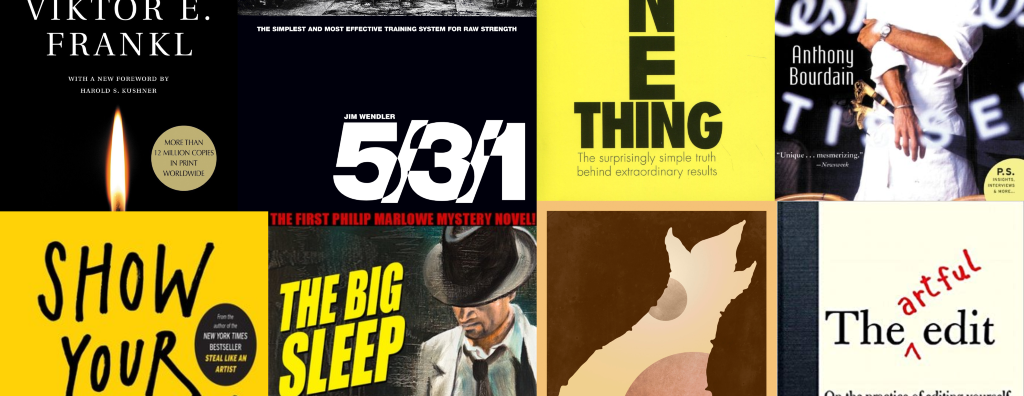This idea was originally inspired by Julien Smith, a much more prolific reader than I. Here are my lists from years past: 2012, 2013, 2014, 2015, 2016 and 2017.
Turns out I still like books, and other than getting to read more on public transit (thanks Japan life!) my reading habits didn’t change much in 2018.
I read slightly more fiction than usual in part due to two friends publishing their first novels (congrats Kyle and Sean!) and from feeling re-inspired to catch up on classics I missed out on in high school: instead of trying to read Modern Library’s 100 Best Novels of All-Time, my new goal is to tackle a modified version of Joel Patrick’s Ultimate Reading List and read the 156 books that appear on at least two of eight different read-before-you-die lists. Check out my modified list (and my slow progress) here or connect with me on Goodreads.
But before diving back into that moonshot mission, I like to use the end of the year as an excuse to revisit my Kindle highlights, pick out some favorite passages, and remind myself how little of what I read I actually remember.
WTF? What’s the Future and Why It’s Up to Us by Tim O’Reilly
1) That is the essence of the Maker movement. Making for the joy of exploration. Making to learn. There’s no joy in our current education system. It is full of canned solutions to be memorized when it needs to be a vast collection of problems to be solved. When you start with what you want to accomplish, knowledge becomes a tool. You seek it out, and when you get it, it is truly yours.
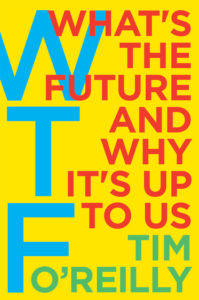
2) I’m fascinated by a comment that Hal Varian, Google’s chief economist, made to me over dinner one night: “If you want to understand the future, just look at what rich people do today.”
Dining out was once the province of the wealthy. Now far more people do it. In our most vibrant cities, a privileged class experiences a taste of a future that could be the future for everyone. Restaurants compete on the basis of creativity and service, “everyone’s private driver” whisks people around in comfort from experience to experience, and one-of-a-kind boutiques provide unique consumer goods. Rich people once took the European grand tour; now soccer hooligans do it. Cell phones, designer fashion, and entertainment have all been democratized. Mozart had the Holy Roman Emperor as his patron; Kickstarter, GoFundMe, and Patreon extend that opportunity to millions of ordinary people.
Show Your Work! by Austin Kleon
3) You have to remember that your work is something you do, not who you are. This is especially hard for artists to accept, as so much of what they do is personal.
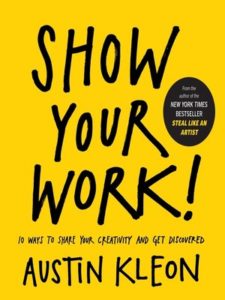
4) Today it is the amateur—the enthusiast who pursues her work in the spirit of love (in French, the word means “lover”), regardless of the potential for fame, money, or career—who often has the advantage over the professional. Because they have little to lose, amateurs are willing to try anything and share the results. They take chances, experiment, and follow their whims. Sometimes, in the process of doing things in an unprofessional way, they make new discoveries. “In the beginner’s mind, there are many possibilities,” said Zen monk Shunryu Suzuki. “In the expert’s mind, there are few.”
Dune by Frank Herbert
5) “Do you see a way to go?” Jessica asked, mistaking his hesitation. “No,” he said, “But we’ll go anyway.”

6) “I must not fear. Fear is the mind-killer. Fear is the little-death that brings total obliteration. I will face my fear. I will permit it to pass over me and through me. And when it has gone past I will turn the inner eye to see its path. Where the fear has gone there will be nothing. Only I will remain.”
Hey Whipple, Squeeze This by Luke Sullivan and Edward Boches
7) Here’s the formula I see work effectively over and over again: Do > Invite > Document > Share. Do something interesting, but on strategy, of course. Conceive the idea so that it allows people to participate, and find a way to invite them to join in. Document the event so it lives beyond the event and becomes content. Make it shareable across every relevant channel.
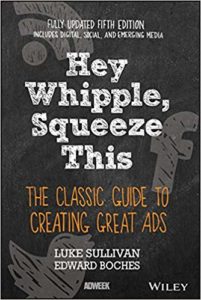
8) Now that you know you need to write like that particular brand, I also have to encourage you to write like people talk; in the copy you write for ads, in e-mails to clients, and letters to the editor, write like regular people talk. For some reason, when handed a pen and asked to write something that will be seen by others, 9 out of 10 people decide an authoritarian tone is somehow more persuasive than clear English.
There’s a cost to this, which the authors of The Cluetrain Manifesto made clear in their famous 95 Theses: “In just a few more years, the current homogenized ‘voice’ of business—the sound of mission statements and brochures—will seem as contrived and artificial as the language of the 18th century French court.…[C]ompanies that speak in the language of the pitch, the dog-and-pony show, are no longer speaking to anyone.”
Hillbilly Elegy by J.D. Vance
9) The Pew Economic Mobility Project studied how Americans evaluated their chances at economic betterment, and what they found was shocking. There is no group of Americans more pessimistic than working-class whites. Well over half of blacks, Latinos, and college-educated whites expect that their children will fare better economically than they have. Among working-class whites, only 44 percent share that expectation. Even more surprising, 42 percent of working-class whites—by far the highest number in the survey—report that their lives are less economically successful than those of their parents’.

10) The family-based hiring practices of the major industrial firms had their desired effect, and the results were predictable. All over the industrial Midwest, new communities of Appalachian transplants and their families sprang up, virtually out of nowhere. As one study noted, “Migration did not so much destroy neighborhoods and families as transport them.” In 1950s Middletown [Ohio], my grandparents found themselves in a situation both new and familiar. New because they were, for the first time, cut off from the extended Appalachian support network to which they were accustomed; familiar because they were still surrounded by hillbillies.
Man’s Search For Meaning by Viktor Frankl
11) The way in which a man accepts his fate and all the suffering it entails, the way in which he takes up his cross, gives him ample opportunity—even under the most difficult circumstances—to add a deeper meaning to his life. It may remain brave, dignified and unselfish. Or in the bitter fight for self-preservation he may forget his human dignity and become no more than an animal. Here lies the chance for a man either to make use of or to forgo the opportunities of attaining the moral values that a difficult situation may afford him. And this decides whether he is worthy of his sufferings or not.
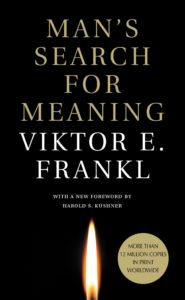
12) Fifty years ago, I published a study devoted to a specific type of depression I had diagnosed in cases of young patients suffering from what I called “unemployment neurosis.” And I could show that this neurosis really originated in a twofold erroneous identification: being jobless was equated with being useless, and being useless was equated with having a meaningless life. Consequently, whenever I succeeded in persuading the patients to volunteer in youth organizations, adult education, public libraries and the like—in other words, as soon as they could fill their abundant free time with some sort of unpaid but meaningful activity—their depression disappeared although their economic situation had not changed and their hunger was the same. The truth is that man does not live by welfare alone.
Catcher in the Rye by JD Salinger
13) What I was really hanging around for, I was trying to feel some kind of a good-by. I mean I’ve left schools and places I didn’t even know I was leaving them. I hate that. I don’t care if it’s a sad good-by or a bad goodby, but when I leave a place I like to know I’m leaving it. If you don’t, you feel even worse.

14) A lot of people, especially this one psychoanalyst guy they have here, keeps asking me if I’m going apply myself when I go back to school next September. It’s such a stupid question, in my opinion. I mean how do you know what you’re going to do till you do it? The answer is, you don’t. I think I am, but how do I know? I swear it’s a stupid question.
You Gotta Have Wa by Robert Whiting
15) Foreign players in Japan have long spoken of barriers, both visible and invisible, that effectively keep them from winnings titles, breaking records, or otherwise gaining recognition. The most frequent targets of their complaints have been from the umpires. As Leron Lee once said, “It’s almost a natural law for a gaijin that the higher your batting average goes, the wider your strike zone becomes. The umpires will see to it because you’re not supposed to outshine the Japanese.”

16) Although Imperial Army soldiers were heard to scream “To hell with Babe Ruth” in the jungles of the South Pacific, Ruth was still deemed to have a high enough standing with the Japanese that he was almost called upon to act as a peace negotiator in the fading months of the war. A U.S. government plan called for the Babe to be flown to Guam to make a series of radio broadcasts to the people of Japan. As Ruth put it, he was to appeal to their sporting instincts to give up, and to tell them what the U.S. had in store for them if they did not surrender. In the end however, the plan was scrapped as the U.S. high command opted for a more forceful approach: the A-Bomb.
Souvenir by Rolf Potts
17) After tipping some local servants to gain access to the Bard’s tomb and birthplace, the two American statesmen did something that to the modern imagination smacks of adolescent-grade vandalism: taking turns with a pocket knife, Jefferson and Adams each carved chunks from an antique chair alleged to have belonged to Shakespeare, and took the wood shavings home as souvenirs.

18) In an era before the availability of inexpensive snapshot cameras, postcards became a powerful medium for evoking what various corners of the world looked like, and how one might interact with them. Postcard entrepreneurs popularized notions of what sights were worth seeing in a given location, and postcard artists and photographers presented idealized visions of how it should be seen. Even as point-and-shoot snapshots gradually replaced postcards over the course of the twentieth century, tourist photographs tended to mimic the visual clichés of postcard images (a trend that has persisted into the age of digital photos and social media).
Draft No. 4 by John McPhee
19) “Penn’s daughter Margaret fished in the Delaware, and wrote home to a brother asking him to “buy for me a four joynted strong fishing Rod and Real with strong good Lines.…”
The problem was not with the rod or the real but with William Penn’s offspring. Should there be commas around Margaret or no commas around Margaret? The presence or absence of commas would, in effect, say whether Penn had one daughter or more than one. The commas—there or missing there—were not just commas; they were facts.

20) Shawn also recognized that no two writers are the same, like snowflakes and fingerprints. No one will ever write in just the way that you do, or in just the way that anyone else does. Because of this fact, there is no real competition between writers. What appears to be competition is actually nothing more than jealousy and gossip. Writing is a matter strictly of developing oneself. You compete only with yourself. You develop yourself by writing. An editor’s goal is to help writers make the most of the patterns that are unique about them.
Lord of the Flies by William Golding
21) “After all, we’re not savages. We’re English, and the English are best at everything. So we’ve got to do the right things.”

22) Now the sea would suck down, making cascades and waterfalls of retreating water, would sink past the rocks and plaster down the seaweed like shining hair: then, pausing, gather and rise with a roar, irresistibly swelling over point and outcrop, climbing the little cliff, sending at last an arm of surf up a gully to end a yard or so from him in fingers of spray.
American Terroir by Rowan Jacobsen
23) If you have forty gallons of sap, you must boil off thirty-nine gallons of water to yield one gallon of maple syrup. That’s why maple syrup is so expensive and why the syrup market is dominated by artificial products containing not a drop of real maple. What you are paying for in the genuine artifact is a terrific amount of fuel, along with somebody’s long nights in the sugarhouse tending the sap as it boils.

24) We are some of the first people in history not to have built-in connections to the land we inhabit, not to be able to take comfort and pleasure in its verities. Paying attention to terroir is one of the best and most enjoyable ways to reestablish the relationship. It can teach us much about who we are, why we like what we like, and how we go about living on this earth. It can allow us to rediscover a romance that is exhilarating, fortifying, and real.
1776 by David McCullough
25) It was also a matter of record that Washington had been retired from military life for fifteen years, during which he had not even drilled a militia company. His only prior experience had been in backwoods warfare—a very different kind of warfare—and most notably in the Braddock campaign of 1755, which had been a disaster. He was by no means an experienced commander. He had never led an army in battle, never before commanded anything larger than a regiment. And never had he directed a siege.

26) Far more, however, would be said later and repeated endlessly of Hessians who supposedly, on the morning of the attack, were still reeling drunk or in a stupor from having celebrated Christmas in the Germanic tradition. But there is no evidence that any of them were drunk. John Greenwood, who was in the thick of the fight, later wrote, “I am willing to go upon oath that I did not see even a solitary drunken soldier belonging to the enemy.” Major James Wilkinson, the young officer who had been present at the capture of General Lee and who also fought at Trenton and later wrote an account of the battle, made no mention of anyone being drunk.
The One Thing by Gary Keller with Jay Papasan
27) “What’s the ONE Thing you can do this week such that by doing it everything else would be easier or unnecessary?”
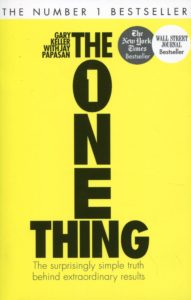
28) The inequality of effort for results is everywhere in your life if you will simply look for it. And if you apply this principle, it will unlock the success you seek in anything that matters to you. There will always be just a few things that matter more than the rest, and out of those, one will matter most. Internalizing this concept is like being handed a magic compass. Whenever you feel lost or lacking direction, you can pull it out to remind yourself to discover what matters most.
How To Write About Music by Marc Woodworth and Ally-Jane Grossan
29) In 30 years, unless you’re a genius (and probably not even then), no one is going to care about the quality of your work, and no one will accurately remember anything you published about some arcane album that nobody listened to … except you. You will care, and you will remember. So if you can’t satisfy yourself, you ultimately can’t satisfy anyone else. That said, nobody believes their own writing is brilliant; only crazy people think like that. So if you’re insecure about your work and you lack confidence in your ability, it might just mean you’re reasonable.

30) Swifties see the characteristic at hand for what it is: writing. Her songs are her point of view, making it her job to blow up the most minor event into something that more accurately represents the way she experienced it. As Tay quoted Neruda in her Red liner notes, “Love is so short, forgetting is so long.” This is basic Nabokov shit, right? Everything hits harder in memory. Everything changes color. Her first album will tell you she is a natural crusher, daydreamer, hopeless romantic. Obsessing over the briefest of encounters is what we do. She was just born to translate it for millions of people.
Kitchen Confidential by Anthony Bourdain (RIP)
31) Brunch menus are an open invitation to the cost-conscious chef, a dumping ground for the odd bits left over from Friday and Saturday nights or for the scraps generated in the normal course of business. You see a fish that would be much better served by quick grilling with a slice of lemon, suddenly all dressed up with vinaigrette? For ‘en vinaigrette’ on the menu, read ‘preserved’ or ‘disguised’.

32) Given these perils. . why? Why would anyone want to do it? Inarguably, a successful restaurant demands that you live on the premises for the first few years, working seventeen-hour days, with total involvement in every aspect of a complicated, cruel and very fickle trade. You must be fluent in not only Spanish but the Kabbala-like intricacies of health codes, tax law, fire department regulations, environmental protection laws, building code, occupational safety and health regs, fair hiring practices, zoning, insurance, the vagaries and back-alley back-scratching of liquor licenses, the netherworld of trash removal, linen, grease disposal. And with every dime you’ve got tied up in your new place, suddenly the drains in your prep kitchen are backing up with raw sewage, pushing hundreds of gallons of impacted crap into your dining room; your coke-addled chef just called that Asian waitress who’s working her way through law school a chink, which ensures your presence in court for the next six months; your bartender is giving away the bar to under-age girls from Wantagh, anyone of whom could then crash Daddy’s Buick into a busload of divinity students, putting your liquor license in peril, to say the least; the Ansel System could go off, shutting down your kitchen in the middle of a ten-thousand-dollar night; there’s the ongoing struggle with rodents and cockroaches, anyone of which could crawl across the Tina Brown four-top in the middle of the dessert course; you just bought 10,000 dollars-worth of shrimp when the market was low, but the walk-in freezer just went on the fritz and naturally it’s a holiday weekend, so good luck getting a service call in time; the dishwasher just walked out after arguing with the busboy, and they need glasses now on table seven; immigration is at the door for a surprise inspection of your kitchen’s Green Cards; the produce guy wants a certified check or he’s taking back the delivery; you didn’t order enough napkins for the weekend-and is that the New York Times reviewer waiting for your hostess to stop flirting and notice her?
The Big Sleep by Raymond Chandler
33) His glass eye shone brightly up at me and was by far the most lifelike thing about him.
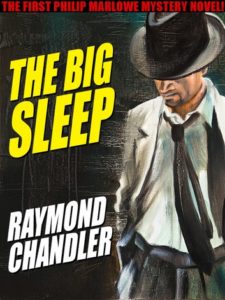
34) What did it matter where you lay once you were dead? In a dirty sump or in a marble tower on top of a high hill? You were dead, you were sleeping the big sleep, you were not bothered by things like that. Oil and water were the same as wind and air to you. You just slept the big sleep, not caring about the nastiness of how you died or where you fell.
everyone’s a aliebn when ur a aliebn too by Jomny Sun
35) i love art. to experience sombodys art is to be invited into a silent conversation they are having with themself.

36) wat happens after we die
nobody knows. thats why it is scarey.
maybe the reason why we dont know is becuase it is so wonderful that nobody ever thought to turn back around to tell us.
Thoughts of An Eaten Sun by Kyle Tolle
37) How could she hold on to the memory of someone without also holding on to the grief of losing them? The grief and the memories were intertwined.

38) “I’ll accept my fate and meet the frigid end as soon as it’ll have me. Then I can join my family in rest. They lie many miles away, but my blood will seep into the world just as theirs does. When Iomesel is buried in ice, when the core of the planet is the only heat to know, our blood will mingle deep underground and the world might know family and its love doesn’t die with our bodies.”
The Artful Edit by Susan Bell
39) It’s interesting that the word editor—in the American sense—does not exist in other languages. For example, the policy in Latin America with magazines is that you pretty much sink or swim according to what you wrote. They correct spelling mistakes and obvious things like that, but they pretty much publish it the way you wrote it. The result is that any given magazine has a much greater diversity of voices than American magazines have. There’s a greater diversity of quality, too, but there’s a greater diversity of voices, unlike American magazines that all end up sounding as though they were written by the same person because the editor keeps rewriting the piece. Because they have a house style. Everything gets poured into the mold. It doesn’t matter what the subject is. Everything has to be in that beautifully polished prose. The editors sort of throw it into the Cuisinart and it all comes out sounding the same.
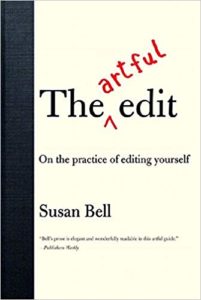
40) Also, to read pages horizontally is quite different from reading them in a stack, where you see only one page at a time. You can see proportions better when you read across, page to page to page, glancing back and forth, and stepping back to take in a view of the whole typographic design of a chapter. You will more easily see whether you’ve used too many tiny or lengthy paragraphs in one area. If you have a specific concern, use a highlighter or the bold key on your computer to make it stand out, then hang the pages up and observe where the color or bold type is either dense or absent—this may tell you if there is too little of one person, for instance, too much of one verb, too little dialogue, or too much of a leitmotiv. On hearing of the laundry-line method, Laura Kipnis, author of Against Love, said, “O no, I could never do that. I have to lay it all out on the floor.” She walks or crawls around on top of her pages, reading and moving them as pieces of a puzzle. Jim Lewis tapes his pages to the wall. He will print his manuscript out in a tiny, unreadable font size, so he can hang the entire book up. He will look at it like a painting or a map, searching for topographical imbalances. Whichever way you choose—cord and clips, wall and tape, or floor—it can be valuable when you edit to look at your manuscript’s topography.
Anansi Boys by Neil Gaiman
41) Spider said, “How’d he die?” “Heart failure.” “That doesn’t mean anything. That just means he died.” “Well, yes. He did.”

42) It is a small world. You do not have to live in it particularly long to learn that for yourself. There is a theory that, in the whole world, there are only five hundred real people (the cast, as it were; all the rest of the people in the world, the theory suggests, are extras) and what is more, they all know each other. And it’s true, or true as far as it goes. In reality the world is made of thousands upon thousands of groups of about five hundred people, all of whom will spend their lives bumping into each other, trying to avoid each other, and discovering each other in the same unlikely teashop in Vancouver. There is an unavoidability to this process. It’s not even coincidence. It’s just the way the world works, with no regard for individuals or for propriety.
5/3/1: The Simplest and Most Effective Training System to Increase Raw Strength by Jim Wendler
43) When you’re choosing your assistance exercises, do yourself a favor and justify why you’re doing them. Don’t bullshit yourself. You must have a very strong reason for doing an exercise. If you don’t, scrap it and move on. Sometimes, instead of what you do in the weight room, it’s what you don’t do that will lead to success.
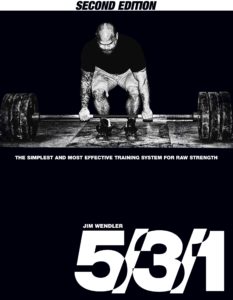
44) Starting too light allows for more time for you to progress forward. It’s easy for anyone – beginner or advanced – to want to get ahead of themselves. Your lifts will go up for a few months, but then they’ll stall – and stall, and stall some more. Lifters get frustrated and don’t understand that the way around this is to prolong the time it takes to get to the goal. You have to keep inching forward. This is a very hard pill to swallow for most lifters. They want to start heavy, and they want to start now. This is nothing more than ego, and nothing will destroy a lifter faster, or for longer, than ego.
Farewell My Lovely by Raymond Chandler
45) The driver looked as if he was half asleep but he passed the fast boys in the convertible sedans as though they were being towed. They turned on all the green lights for him.

46) It got darker. The glare of the red neon sign spread farther and farther across the ceiling. I sat up on the bed and put my feet on the floor and rubbed the back of my neck. I got up on my feet and went over to the bowl in the corner and threw cold water on my face. After a little while I felt a little better, but very little. I needed a drink, I needed a lot of life insurance. I needed a vacation, I needed a home in the country. What I had was a coat, a hat and a gun. I put them on and went out of the room.
We Have Always Lived In The Castle by Shirley Jackson
47) “If I am spared,” he always said to Constance, “I will write the book myself. If not, see that my notes are entrusted to some worthy cynic who will not be too concerned with the truth.”

48) I had to put down the shopping bag to open the lock on the gate; it was a simple padlock and any child could have broken it, but on the gate was a sign saying PRIVATE NO TRESPASSING and no one could go past that.
Football Scouting Methods by Steve Belichick
49) Too often the opposing team is given too much credit for being able to do many things offensively that it has not shown. Probably a better approach to game planning would be to play the opponent for what has been shown, but respect that opponent for what it might do. If an opponent gives you something definite to key and play, it seems logical to play the key with some caution, and not gamble that the key is completely foolproof. Play it until the key is proved wrong, or until something more has been added to neutralize the key. But to simply assert that another team could do one thing or another does not give that team the ability nor the techniques for such accomplishments. It must be remembered that the opponent’s practice time is limited also.
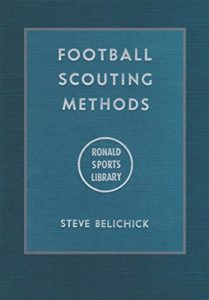
50) A quarterback uses several methods to go back to pass, he will usually have a reason for it. On some types of passes, he will go back one way, and on passes to a certain area he may use a different technique. As proficient as most professional quarterbacks are, there are several in the National Football League that generally tip-off the area to which they are going to pass, or the area where their primary receiver is. When they “back pedal,” they are usually going to throw the ball to the left, and when they run back side ways, they generally throw the ball over the middle or to the right. Since two of these passers are high in the list of those passers with the most interceptions, it seems that some of their opponents are aware of this.
The Judgement: Transmutation by Alexander Dennison
51) “Your incompetence created me.” She said bluntly. She stood to one side and the fragile glass that governed Ford’s sanity exploded, showering him once again with the tendrils of lunacy.

52) He realised afterwards that he was probably breaking so many laws at the same time when he revved the engine; theft, unsafe apparel and likely the most humiliating one – public indecency as his hospital gown swayed erratically in the wind.
Waking Up by Sam Harris
53) It is usually easy to detect social and psychological problems in any community of spiritual seekers. This seems to be yet another liability inherent to the project of self-transcendence. Many people renounce the world because they can’t find a satisfactory place in it, and almost any spiritual teaching can be used to justify a pathological lack of ambition. For someone who has not yet succeeded at anything and who probably fears failure, a doctrine that criticizes the search for worldly success can be very appealing. And devotion to a guru—a combination of love, gratitude, awe, and obedience—can facilitate an unhealthy return to childhood. In fact, the very structure of this relationship can condemn a student to a kind of intellectual and emotional slavery.
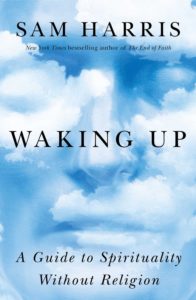
54) Imagine that several of your friends have already traveled to Mars this way and seem none the worse for it.
They describe the experience as being one of instantaneous relocation: You push the green button and find yourself standing on Mars—where your most recent memory is of pushing the green button on Earth and wondering if anything would happen. So you decide to travel to Mars yourself.
However, in the process of arranging your trip, you learn a troubling fact about the mechanics of teleportation: It turns out that the technicians wait for a person’s replica to be built on Mars before obliterating his original body on Earth. This has the benefit of leaving nothing to chance; if something goes wrong in the replication process, no harm has been done. However, it raises the following concern: While your double is beginning his day on Mars with all your memories, goals, and prejudices intact, you will be standing in the teleportation chamber on Earth, just staring at the green button. Imagine a voice coming over the intercom to congratulate you for arriving safely at your destination; in a few moments, you are told, your Earth body will be smashed to atoms.
How would this be any different from simply being killed?
To most readers, this thought experiment will suggest that psychological continuity—the mere maintenance of one’s memories, beliefs, habits, and other mental traits—is an insufficient basis for personal identity. It’s not enough for someone on Mars to be just like you; he must actually be you. The man on Mars will share all your memories and will behave exactly as you would have. But he is not you—as your continued existence in the teleportation chamber on Earth attests. To the Earth-you awaiting obliteration, teleportation as a means of travel will appear a horrifying sham: You never left Earth and are about to die. Your friends, you now realize, have been repeatedly copied and killed. And yet, the problem with teleportation is somehow not obvious if a person is disassembled before his replica is built. In that case, it is tempting to say that teleportation works and that “he” is really stepping onto the surface of Mars.

